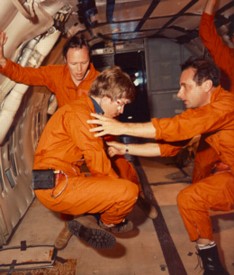Space adaptation syndrome
Editor-In-Chief: Prab R Tumpati, MD
Obesity, Sleep & Internal medicine
Founder, WikiMD Wellnesspedia &
W8MD medical weight loss NYC and sleep center NYC
| Space adaptation syndrome | |
|---|---|

| |
| Synonyms | Space motion sickness |
| Pronounce | N/A |
| Specialty | N/A |
| Symptoms | Nausea, vomiting, vertigo, malaise |
| Complications | N/A |
| Onset | Within hours of entering microgravity |
| Duration | Typically 2-3 days |
| Types | N/A |
| Causes | Microgravity |
| Risks | Space travel |
| Diagnosis | Clinical evaluation |
| Differential diagnosis | Motion sickness, vestibular disorders |
| Prevention | Gradual acclimation, medication |
| Treatment | Antiemetics, rest |
| Medication | N/A |
| Prognosis | N/A |
| Frequency | Affects approximately 50-70% of astronauts |
| Deaths | N/A |
Space adaptation syndrome (SAS), also known as space motion sickness (SMS), is a condition experienced by some astronauts during the initial adaptation to the microgravity environment of space. It is a type of motion sickness that occurs when the vestibular system in the inner ear, which helps control balance and spatial orientation, receives conflicting signals from the visual system and other sensory inputs.
Symptoms[edit | edit source]
The symptoms of space adaptation syndrome can vary in severity and may include:
These symptoms typically occur within the first 48 hours of exposure to microgravity and usually subside as the astronaut's body adapts to the new environment.
Causes[edit | edit source]
Space adaptation syndrome is caused by the lack of gravity in space, which disrupts the normal functioning of the vestibular system. On Earth, gravity provides a constant reference point for the body, helping to maintain balance and spatial orientation. In the microgravity environment of space, this reference point is lost, leading to sensory conflicts and the symptoms of SAS.
Prevention and Treatment[edit | edit source]
Several strategies have been developed to prevent and treat space adaptation syndrome, including:
- **Pre-flight training**: Astronauts undergo extensive training to prepare for the effects of microgravity, including simulations and exposure to reduced-gravity environments.
- **Medications**: Anti-nausea medications, such as scopolamine and promethazine, can be used to alleviate symptoms.
- **Adaptation**: Most astronauts naturally adapt to the microgravity environment within a few days, and symptoms typically subside without the need for intervention.
Impact on Space Missions[edit | edit source]
Space adaptation syndrome can impact the performance of astronauts during the initial phase of a mission. It is important for mission planners to account for the potential effects of SAS and to schedule activities accordingly. Understanding and mitigating the effects of SAS is crucial for the success of long-duration space missions, such as those to the International Space Station (ISS) or future missions to Mars.
Research[edit | edit source]
Ongoing research aims to better understand the mechanisms underlying space adaptation syndrome and to develop more effective prevention and treatment strategies. Studies conducted on the ISS and other space missions provide valuable data on the physiological and psychological effects of microgravity on the human body.
See also[edit | edit source]
References[edit | edit source]
External links[edit | edit source]
Search WikiMD
Ad.Tired of being Overweight? Try W8MD's physician weight loss program.
Semaglutide (Ozempic / Wegovy and Tirzepatide (Mounjaro / Zepbound) available.
Advertise on WikiMD
|
WikiMD's Wellness Encyclopedia |
| Let Food Be Thy Medicine Medicine Thy Food - Hippocrates |
Translate this page: - East Asian
中文,
日本,
한국어,
South Asian
हिन्दी,
தமிழ்,
తెలుగు,
Urdu,
ಕನ್ನಡ,
Southeast Asian
Indonesian,
Vietnamese,
Thai,
မြန်မာဘာသာ,
বাংলা
European
español,
Deutsch,
français,
Greek,
português do Brasil,
polski,
română,
русский,
Nederlands,
norsk,
svenska,
suomi,
Italian
Middle Eastern & African
عربى,
Turkish,
Persian,
Hebrew,
Afrikaans,
isiZulu,
Kiswahili,
Other
Bulgarian,
Hungarian,
Czech,
Swedish,
മലയാളം,
मराठी,
ਪੰਜਾਬੀ,
ગુજરાતી,
Portuguese,
Ukrainian
Medical Disclaimer: WikiMD is not a substitute for professional medical advice. The information on WikiMD is provided as an information resource only, may be incorrect, outdated or misleading, and is not to be used or relied on for any diagnostic or treatment purposes. Please consult your health care provider before making any healthcare decisions or for guidance about a specific medical condition. WikiMD expressly disclaims responsibility, and shall have no liability, for any damages, loss, injury, or liability whatsoever suffered as a result of your reliance on the information contained in this site. By visiting this site you agree to the foregoing terms and conditions, which may from time to time be changed or supplemented by WikiMD. If you do not agree to the foregoing terms and conditions, you should not enter or use this site. See full disclaimer.
Credits:Most images are courtesy of Wikimedia commons, and templates, categories Wikipedia, licensed under CC BY SA or similar.
Contributors: Prab R. Tumpati, MD

